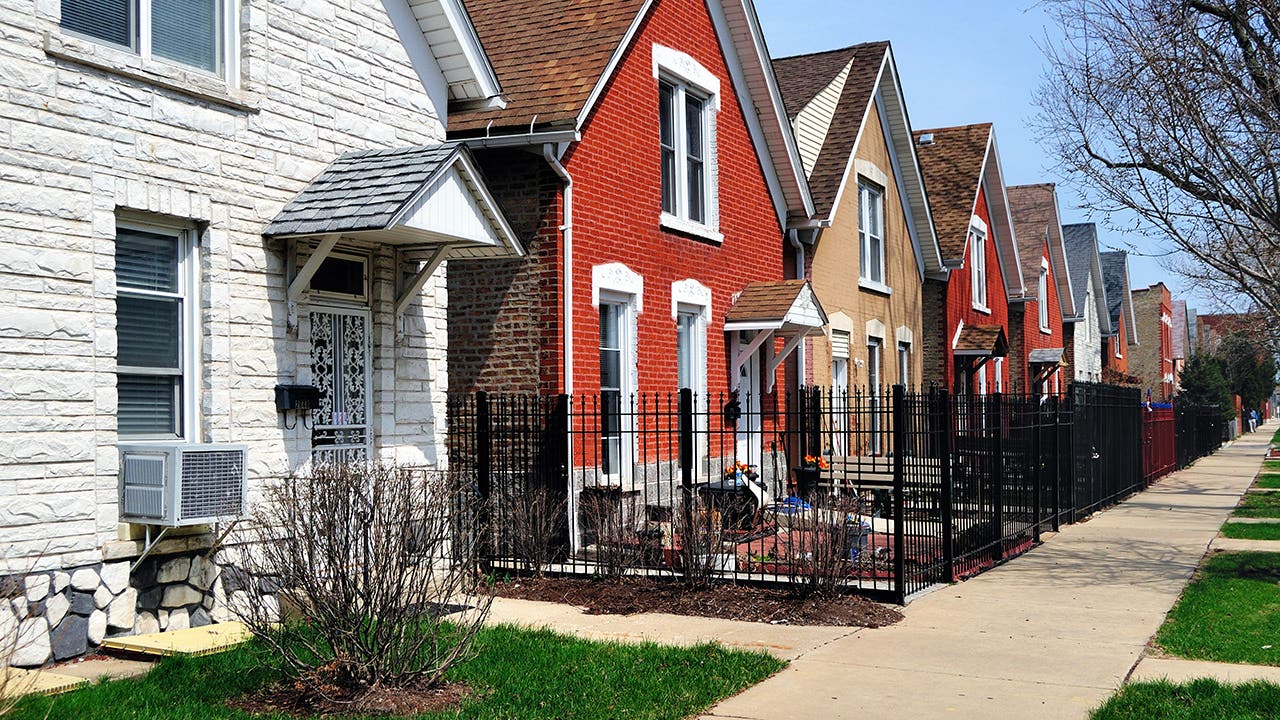Buying a house in Illinois: A how-to

If you’re thinking about buying a house in Illinois, the pathway to purchase can look a lot different depending on where exactly you’re hoping to call home. Prices in the Chicago metro area, particularly in expensive suburbs like Wilmette and Winnetka, can be exponentially higher than in, say, the Champaign-Urbana region, where the median sale price stood at an affordable $195,000 in August of 2022, according to Illinois Realtors.
No matter where you want to plant your roots, though, you might be contemplating a tough question: Should you buy a house now or wait? The economy feels uncertain amidst rising mortgage rates and persistent inflation, which can make the thought of handing over a huge amount of cash feel a bit daunting. However, buying right now can still make plenty of sense. If you have long-term plans to stay in Illinois, buying now means immediately building equity instead of paying rent.
Read on for some key considerations about where to look, how to budget and what to expect from the homebuying process in Illinois.
How to buy a house in Illinois
Decide where to live in Illinois
The college-town vibes of Champaign or Carbondale, the riverside charm of Rock Island or Moline, and of the course the big-city buzz of Chicago — picking the best place to call home in Illinois isn’t an easy decision. While you’ll likely start by comparing the cost of housing in each place on your list, it’s crucial to think about the cost of everything else too, like transportation, utilities, food and entertainment, to understand how far your income will take you in different parts of Illinois. Bankrate’s cost of living calculator is a great place to start your research. For example, it shows that living in Peoria is nearly 40 percent cheaper than living in Chicago.
Buying a home is a long-term investment, so you’ll want to give careful consideration to what you and your family will need down the road as well. Be sure to think about public schools, healthcare options and other factors that may not impact you today but will play a role in your future.
Tips for buying a house in Illinois
As you start comparing mortgage rates in Illinois, it’s important to understand how home values — and the amount you’ll need to borrow to purchase one — can impact the type of loan you’ll need. If you’re planning to use an FHA loan to buy a home in Illinois, you won’t be able to borrow more than $420,680 in 2022. And if you’re applying for a conventional loan, your borrowing is capped at $647,200 across every county in Illinois. If you need more, you’ll be crossing into jumbo loan territory, which means you’ll need even better credit and a bigger down payment.
Things to know about buying a house in Illinois
- Property taxes: After you pay the seller for a home in Illinois, get ready to pay the government, too. Property taxes here are high — the second-highest in the nation as a percentage of value, according to the Tax Foundation. Be sure to ask the seller for their most recent property tax bill to get a sense of what you’ll owe.
- Dual agency: Dual agency is permitted in Illinois. That means that your agent could also be representing the person whose home you want to buy. Since that can create an obvious conflict of interest, it’s up to you whether to agree to the arrangement. If you do, you’ll need to sign a consent form.
- Seller’s disclosure: Illinois law requires sellers to complete a 23-question property disclosure form with all knowledge of any defects or problems with the home. Keep in mind that the seller’s disclosure doesn’t mean you don’t need a home inspection; these forms only include problems the owner actually knows about.
- Closing costs: In 2021, the average closing costs in Illinois added up to just under $6,000, according to ClosingCorp. However, it’s important to note that those costs may not all fall on your shoulders as the buyer. For example, in Chicago, the seller is responsible for a portion of the real estate transfer taxes.
- Attorneys: While the state of Illinois does not legally require you to hire a lawyer, it’s smart for buyers to retain the services of a professional real estate attorney to help prepare the contract and ensure that the title is transferred properly.
- Climate and weather considerations: The Illinois River, the Chicago River, Lake Michigan and more — there are plenty of beautiful bodies of water in Illinois, but that beauty comes with the danger of flooding. Additionally, the state’s Midwestern location means that tornadoes are also a risk. So, as you browse for homeowners insurance, you’ll want to consider all necessary options to protect your home.
How much house can I afford in Illinois?
Doing the math on what you can spend for a new home can seem overwhelming at first, but there is a simple rule that everyone should follow: Do not spend more than 28 percent of your income on your housing costs. So, if you earn $6,000 each month, your monthly mortgage payment should not exceed $1,680.
However, your earnings aren’t the only piece that determines your home budget. When you apply for a mortgage, a lender is going to look at all of your other debts, such as student loans, car payments and credit cards. If you can make a significant dent in those you apply for a home loan, you’ll likely improve your chances of being approved for the lowest interest rate available. It’s a tricky balance, though, because you also need to maintain a healthy chunk of savings for your down payment. Use Bankrate’s new-home calculator to get a sense of what you can afford.
Saving for a down payment in Illinois
The median down payment on a home in Illinois was $26,457 in March of 2022. If that figure makes your heart skip a beat, don’t worry: There are quite a few options to help you come up with the funds you need to become a homeowner here.
The Illinois Housing Development Authority offers four down payment assistance programs. Some are forgivable after a period of five or 10 years, while others require the money to be repaid. To be eligible, you’ll need a minimum credit score of 640, a debt-to-income ratio of 45 percent or lower, an annual income within the agency’s limits and the ability to contribute at least 1 percent or $1,000 of your own money to the purchase. If you qualify, you may be able to borrow between $6,000 and $10,000 to help you buy a home.
While down payment assistance is particularly helpful for first-time homebuyers, Illinois’s programs aren’t just reserved for those trying to get their first properties. And if you’re a low-income borrower trying to buy a home in the city of Chicago, be sure to explore the city’s Building Neighborhoods and Affordable Homes Program, which includes assistance for certain properties in Englewood, Lawndale, Humboldt Park, Garfield Park and Woodland.
Get preapproved for a mortgage
Now, it’s time to officially set the wheels in motion and get preapproved for a mortgage. A preapproval letter will serve as evidence that you will be able to secure the necessary financing to see a deal through to completion. Every seller wants to see this to feel confident about moving forward with your contract. Preapprovals don’t last forever, though; the document may only be good for 60 to 90 days from being issued. So get preapproved when you are getting serious about buying a home.
Find the right lender
When you’re ready to find the lender who will actually loan you the money, keep in mind that it doesn’t have to be the same one that offered you a preapproval. Different lenders offer different repayment terms, loan options, closing costs and interest rates, so comparing a few different mortgage companies licensed in Illinois is crucial to finding the best deal for your finances. Pay close attention to the APR to get a real understanding of the true borrowing costs.
Find the best local real estate agent in Illinois
Once you find someone to loan you the money, it’s time to find someone to help you actually find a house. Having a knowledgeable local real estate agent on your side can make a world of difference when looking for a house in Illinois. Real estate is a hyper-localized industry, and the process of buying a house in Springfield might be quite a bit different than in Arlington Heights. And if you’re trying to buy a house in Illinois while living somewhere else, a Realtor can be your eyes and ears on the ground — especially if a hot new property just hit the market and you can’t be there in time to see it.
Start house hunting and make an offer
The fun can officially begin: You’re ready to look at houses. When you’re house-hunting, be prepared to cast a wide net to find a property that will fit your needs and your budget. For example, if you’re looking in the city of Chicago, you might really want to live within walking distance of the lake. But what about the home in North Center that costs $50,000 less than the one in Lincoln Park? If you can enter the hunt with a willingness to compromise, you’ll put yourself on a path to finding a better deal. And when you find a place you love, your real estate agent will help you determine how to craft a compelling offer that brings the seller to the negotiation table.
Home inspection and appraisal
Your offer was accepted! Now, do your due diligence to make sure you really should buy that particular house. Are there serious issues lurking out of sight, like plumbing problems or a decaying roof? A professional home inspection will alert you to any major red flags before you finalize the deal.
If you are financing your purchase with a mortgage, your lender will require a home appraisal at this stage as well. This is for their protection: The appraiser will assess the fair market value of the property to make sure they aren’t lending you more than the home is worth.
Final walk-through and closing on your new Illinois home
Before you seal the deal, take one final opportunity to check out the condition of the property by scheduling a final walk-through. This time, the work is up to you, not a professional inspector, so use this checklist to make sure you’re looking in all the right places for any potential issues that need to be fixed before it’s officially yours.
After you’re satisfied, it’s time to close on your new home. You’ll need to bring a certified check or cashier’s check to cover your portion of the closing costs; large amounts for real estate transactions can’t be covered by a personal check in Illinois. The closing itself involves signing your name on a mountain of paperwork. Once you finally put your pen down, give yourself a pat on the back: You have your own home in the Land of Lincoln. You’re officially home.
FAQs
-
If you’re applying for a conventional mortgage, most lenders will require a minimum credit score of 620, a low debt-to-income ratio and enough cash to cover at least a 3 percent down payment, plus closing costs. If you’re hoping to secure down payment assistance through one of the Illinois Housing Development Authority’s programs, you’ll need a credit score of at least 640. If you have lower credit, FHA loans are probably your best bet. In some cases, FHA lenders may approve your application with a credit score of just 500, but you’ll need a down payment of at least 10 percent of the purchase price.
-
The housing market in Illinois has been showing some favorable signals for buyers — mainly that prices have declined since June, according to Illinois Realtors data. And if you’re buying in the city of Chicago, the market is looking even better, with a 5 percent year-over-year decrease in the median sale price. There are two big challenges, though: Mortgage rates are on the rise, and housing inventory is shrinking.
-
If you’re applying for a conventional mortgage, you’ll need to put down at least 3 percent of the purchase price. So, if you’re buying a $250,000 home in Illinois, you’ll need to put down at least $7,500. Don’t forget to budget for closing costs, too, which can add thousands of dollars to your upfront expenses.
Why we ask for feedback Your feedback helps us improve our content and services. It takes less than a minute to complete.
Your responses are anonymous and will only be used for improving our website.






